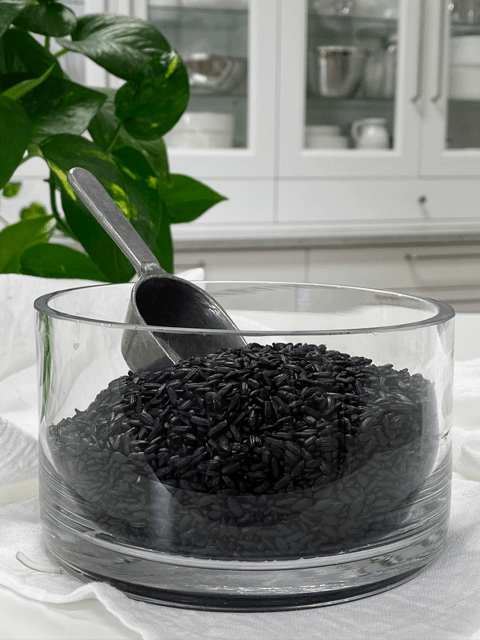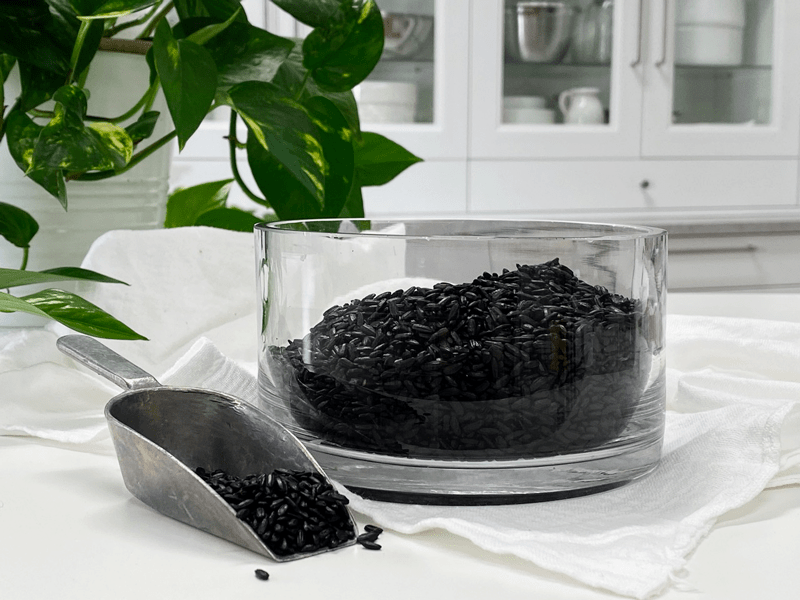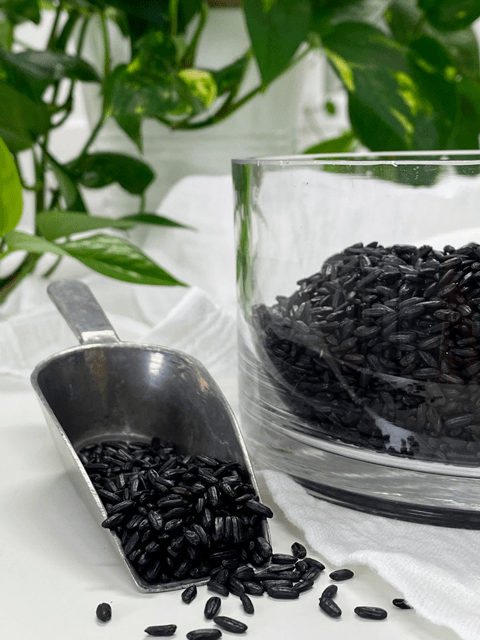


 Add to favorites
Add to favorites
Black rice offers all of the same health benefits of brown rice, but it also packs some serious antioxidants. Because of its dark color, black rice bran contains the same anthocyanin antioxidants found in blueberries or blackberries. The bran is the outer coating of the rice kernel.

White rice is stripped of this, which also removes away the nutrients. So always look for whole grain rice. Black rice is often referred to as “purple rice,” because when it’s soaked or cooked, it changes from black to a deep purple or burgundy color. When you sprout or cook the black rice, it brings a nutty, sweet flavor to the rice and softens the overall texture.
By soaking the forbidden rice, it will split open, make it soft, and make the essential nutrients available. If you have a compromised digestive system, I recommend cooking it, thus making it easier to digest. But only you can make that judgment call.
But just like any other grain, seed, or nut… it needs to be soaked before eating, which helps release the phytic acid that lurks within, which makes certain essential minerals such as zinc and iron calcium and magnesium un-absorbable.
Soaking it will also speed up the cooking time if you choose that route. In fact, it will cut the time in half, which can be helpful.
Grains can be acidic to the body, so to help with the acidity-alkaline balance, I added a small piece (1″) of kombu (sea vegetable) during the cooking process. Kombu contains the amino acid glutamine, a naturally sweet, superior flavor enhancer known as Umami. One the dried sea veggie is soaked, it expands in size and feels a bit slimy. It is very beneficial as it cuts down on gas and improves digestibility. After the rice is through cooking, you can remove the kombu, or you can dice it up and eat it along with your rice.
 Ingredients:
Ingredients:Yields 3 cups
To sprout/soak:
Enjoy raw:
Enjoy cooked:
I was curious as I have never tried cooked sea veggies. Do they taste similar to soaked? I usually have only eaten them raw… Was curious on any extra benefits, or nutritional losses of cooked sea veggies vs raw?
Hello David, I haven’t tested all sea veggie in the raw and/or cooked so I can’t say for sure what the taste difference is. The kombu will act as a nice thickener and the mucilage that is released helps to heal the intestinal lining and aid in digestion. Side by side, I don’t know what the nutritional data is and how it compares when raw or cooked. I know that it is a great aid for digestive system when I add it while cooking certain foods such as; soups, stocks and grains.
I recommend that you read this site, I found it fascinating. http://www.envirohealthtech.com/sea_vegetation.htm
Have a great day, amie sue
When you say “capsule of probiotics” in the instructions, are you referring to the kombu? I am assuming that is what you mean, but I want to make sure. Thank you.
Oh sorry guys… It was an experiment that I was doing by adding the probiotic. I decided to leave it out when I shared the recipe (but forgot to delete it from the preparation section until I found some back up to my theory. :)
Thank you for your inspiration, that is your love.
Should Probiotics or vinegar be used for the soaking?
Thank you Mirna… forget the probiotic for now… It was an experiment that I was doing by adding the probiotic. I decided to leave it out when I shared the recipe (but forgot to delete it from the preparation section until I found some back up to my theory. :) Sorry about that. amie sue
Hi Ami-sue, just curious…should all brown, red and black rice be soaked before cooking? I have IBS, so wouldn’t dare eat it uncooked.
Yes indeed. Same soak process. Vitally important for digestive issues! I agree, cooked is better for you with IBS. Have a great day, amie sue
Does vinegar have to be used for brown rice soak? I’ve tried it and vinegar is a little too strong. Would lemon juice work? One of my family members has a tough time eating un-soaked grains and beans, for some reason she feels full after one bite. Do you think soaking would help this?
Thanks for your articles on soaking :)
Hello Hally, I am surprised that you can detect the vinegar, being only 1 Tbsp and it is rinse away at the end…. but yes, you can use lemon juice. Your family member who doesn’t do well with rice and grains… do they feel this way with cooked ones or do they feel this way when eating them in the raw form? Just want to make sure that I understand how they are consuming them. amie sue
Hi amie-sue,
I have never tried to eat rice raw but I would like to try it. Can it be with any rice? like white or just black?
So far I find it only works with black or a long grain rice. I haven’t tinkered much beyond that. If you have any digestive issues, I would stick with cooked. Just thought that I would throw that out there. Have a great day! amie sue
Hello Amie Sue, as always thank you for such wonderful information. I’ve been wanting to try sprouted Black Rice you gave me all the incentive that I need. I thought you might like to know that end of cooked directions it has this information If the rice wasn’t cooked, it could take up to 60 minutes to cook. Did you mean if the rice wasn’t soaked? Again thank you for everything you’re fantastic!
Hello Michelle,
So nice to hear from you. Thank you for pointing out my typo. I fixed it. It should have read “soaked”. Enjoy and let me know how it goes. Have a blessed day, amie sue :)
We love the sprouted rice. The texture and taste are amazing! Thank you.
That is wonderful Michelle, So happy that you guys are enjoying it. :) I appreciate the feed-back. Blessings, amie sue
Does black rice grow a sprout like brown rices do? I have tried twice to spout forbidden rice and it just seem to break open not grow a spout.
Hello Mel,
When I sprout it, it just cracks open. Blessings, amie sue
Hi Amie-Sue,
Is there a certain brand of black rice that works best, or that you prefer?
Thanks so much most helpful website.
Good morning wellness. I prefer the Lotus brand: https://nouveauraw.com/recommended-ingredients/oats-grains/lotus-foods-heirloom-forbidden-rice-15-ounce-pack-of-6/
Have a blessed and happy day, amie sue :)
Hi….it seems to me that if you soak the rice, you wouldn’t need to add 2 c. of water to the one cup of rice that has been soaked. since the rice has taken in a lot of water, it seems that you would need way less water when cooking it. is that correct? thanks.
Hello Kate,
I made just as indicated in the post and it came out just right. You could always try reducing the water by 1/2 cup if you wanted to. blessings, amie sue
Hello Amie Sue,
I’ve been soaking/sprouting organic brown rice in water heated to 30-40 degrees C (110 degrees F) but never any hotter as it can “kill” the sprouting process per Japanese instructions. I drain the water and cover with more heated water 2-3 times and am amazed at how fast the rice sprouts. I’ve never not seen tiny sprouts emerging as quickly as overnight. My question is: if we’re in a pinch and don’t have a full 8 hours for sprouting, will using heated water speed up the process? Many thanks for your reply!
Hello Leslie,
I don’t know the answer to your question since I have never tried it. Best advice would be to experiment with a small amount and see how it does. If you do, keep us posted. blessings, amie sue